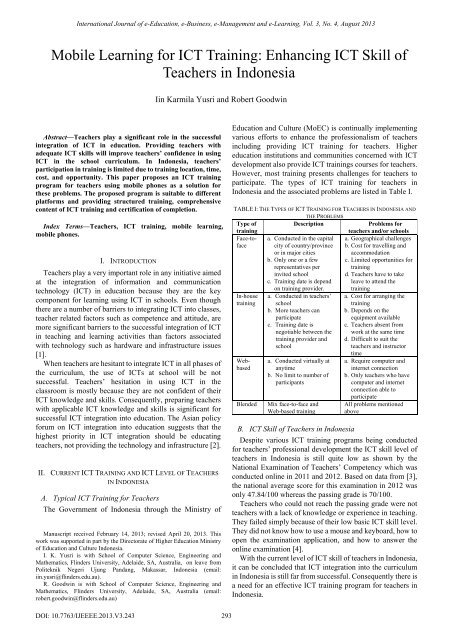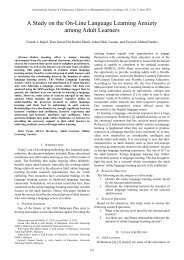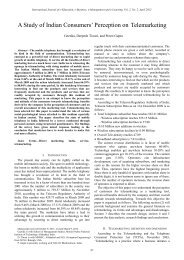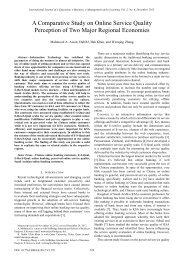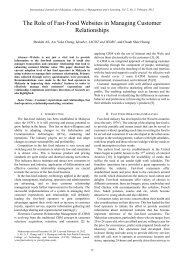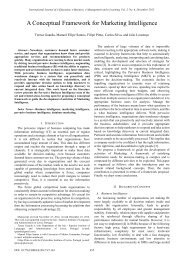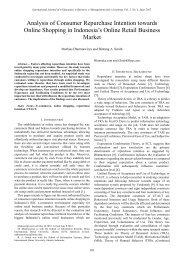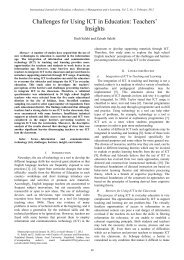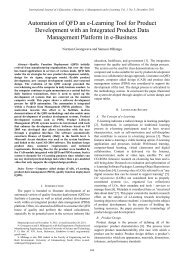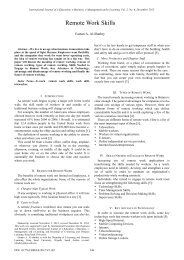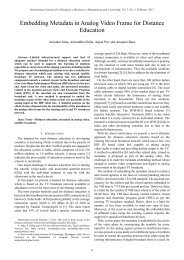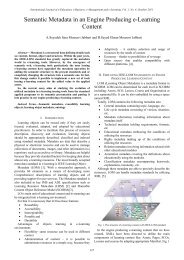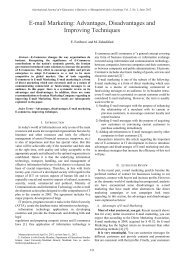Mobile Learning for ICT Training: Enhancing ICT Skill of ... - ijeeee
Mobile Learning for ICT Training: Enhancing ICT Skill of ... - ijeeee
Mobile Learning for ICT Training: Enhancing ICT Skill of ... - ijeeee
You also want an ePaper? Increase the reach of your titles
YUMPU automatically turns print PDFs into web optimized ePapers that Google loves.
International Journal <strong>of</strong> e-Education, e-Business, e-Management and e-<strong>Learning</strong>, Vol. 3, No. 4, August 2013<br />
<strong>Mobile</strong> <strong>Learning</strong> <strong>for</strong> <strong>ICT</strong> <strong>Training</strong>: <strong>Enhancing</strong> <strong>ICT</strong> <strong>Skill</strong> <strong>of</strong><br />
Teachers in Indonesia<br />
Iin Karmila Yusri and Robert Goodwin<br />
<br />
Abstract—Teachers play a significant role in the successful<br />
integration <strong>of</strong> <strong>ICT</strong> in education. Providing teachers with<br />
adequate <strong>ICT</strong> skills will improve teachers’ confidence in using<br />
<strong>ICT</strong> in the school curriculum. In Indonesia, teachers’<br />
participation in training is limited due to training location, time,<br />
cost, and opportunity. This paper proposes an <strong>ICT</strong> training<br />
program <strong>for</strong> teachers using mobile phones as a solution <strong>for</strong><br />
these problems. The proposed program is suitable to different<br />
plat<strong>for</strong>ms and providing structured training, comprehensive<br />
content <strong>of</strong> <strong>ICT</strong> training and certification <strong>of</strong> completion.<br />
Index Terms—Teachers, <strong>ICT</strong> training, mobile learning,<br />
mobile phones.<br />
I. INTRODUCTION<br />
Teachers play a very important role in any initiative aimed<br />
at the integration <strong>of</strong> in<strong>for</strong>mation and communication<br />
technology (<strong>ICT</strong>) in education because they are the key<br />
component <strong>for</strong> learning using <strong>ICT</strong> in schools. Even though<br />
there are a number <strong>of</strong> barriers to integrating <strong>ICT</strong> into classes,<br />
teacher related factors such as competence and attitude, are<br />
more significant barriers to the successful integration <strong>of</strong> <strong>ICT</strong><br />
in teaching and learning activities than factors associated<br />
with technology such as hardware and infrastructure issues<br />
[1].<br />
When teachers are hesitant to integrate <strong>ICT</strong> in all phases <strong>of</strong><br />
the curriculum, the use <strong>of</strong> <strong>ICT</strong>s at school will be not<br />
successful. Teachers’ hesitation in using <strong>ICT</strong> in the<br />
classroom is mostly because they are not confident <strong>of</strong> their<br />
<strong>ICT</strong> knowledge and skills. Consequently, preparing teachers<br />
with applicable <strong>ICT</strong> knowledge and skills is significant <strong>for</strong><br />
successful <strong>ICT</strong> integration into education. The Asian policy<br />
<strong>for</strong>um on <strong>ICT</strong> integration into education suggests that the<br />
highest priority in <strong>ICT</strong> integration should be educating<br />
teachers, not providing the technology and infrastructure [2].<br />
II. CURRENT <strong>ICT</strong> TRAINING AND <strong>ICT</strong> LEVEL OF TEACHERS<br />
IN INDONESIA<br />
A. Typical <strong>ICT</strong> <strong>Training</strong> <strong>for</strong> Teachers<br />
The Government <strong>of</strong> Indonesia through the Ministry <strong>of</strong><br />
Manuscript received February 14, 2013; revised April 20, 2013. This<br />
work was supported in part by the Directorate <strong>of</strong> Higher Education Ministry<br />
<strong>of</strong> Education and Culture Indonesia.<br />
I. K. Yusri is with School <strong>of</strong> Computer Science, Engineering and<br />
Mathematics, Flinders University, Adelaide, SA, Australia, on leave from<br />
Politeknik Negeri Ujung Pandang, Makassar, Indonesia (email:<br />
iin.yusri@flinders.edu.au).<br />
R. Goodwin is with School <strong>of</strong> Computer Science, Engineering and<br />
Mathematics, Flinders University, Adelaide, SA, Australia (email:<br />
robert.goodwin@flinders.edu.au)<br />
Education and Culture (MoEC) is continually implementing<br />
various ef<strong>for</strong>ts to enhance the pr<strong>of</strong>essionalism <strong>of</strong> teachers<br />
including providing <strong>ICT</strong> training <strong>for</strong> teachers. Higher<br />
education institutions and communities concerned with <strong>ICT</strong><br />
development also provide <strong>ICT</strong> trainings courses <strong>for</strong> teachers.<br />
However, most training presents challenges <strong>for</strong> teachers to<br />
participate. The types <strong>of</strong> <strong>ICT</strong> training <strong>for</strong> teachers in<br />
Indonesia and the associated problems are listed in Table I.<br />
TABLE I: THE TYPES OF <strong>ICT</strong> TRAINING FOR TEACHERS IN INDONESIA AND<br />
THE PROBLEMS<br />
Type <strong>of</strong><br />
training<br />
Description<br />
Problems <strong>for</strong><br />
teachers and/or schools<br />
Face-t<strong>of</strong>ace<br />
In-house<br />
training<br />
Webbased<br />
Blended<br />
a. Conducted in the capital<br />
city <strong>of</strong> country/province<br />
or in major cities<br />
b. Only one or a few<br />
representatives per<br />
invited school<br />
c. <strong>Training</strong> date is depend<br />
on training provider.<br />
a. Conducted in teachers’<br />
school<br />
b. More teachers can<br />
participate<br />
c. <strong>Training</strong> date is<br />
negotiable between the<br />
training provider and<br />
school<br />
a. Conducted virtually at<br />
anytime<br />
b. No limit to number <strong>of</strong><br />
participants<br />
Mix face-to-face and<br />
Web-based training<br />
B. <strong>ICT</strong> <strong>Skill</strong> <strong>of</strong> Teachers in Indonesia<br />
a. Geographical challenges<br />
b. Cost <strong>for</strong> travelling and<br />
accommodation<br />
c. Limited opportunities <strong>for</strong><br />
training<br />
d. Teachers have to take<br />
leave to attend the<br />
training<br />
a. Cost <strong>for</strong> arranging the<br />
training<br />
b. Depends on the<br />
equipment available<br />
c. Teachers absent from<br />
work at the same time<br />
d. Difficult to suit the<br />
teachers and instructor<br />
time<br />
a. Require computer and<br />
internet connection<br />
b. Only teachers who have<br />
computer and internet<br />
connection able to<br />
participate<br />
All problems mentioned<br />
above<br />
Despite various <strong>ICT</strong> training programs being conducted<br />
<strong>for</strong> teachers’ pr<strong>of</strong>essional development the <strong>ICT</strong> skill level <strong>of</strong><br />
teachers in Indonesia is still quite low as shown by the<br />
National Examination <strong>of</strong> Teachers’ Competency which was<br />
conducted online in 2011 and 2012. Based on data from [3],<br />
the national average score <strong>for</strong> this examination in 2012 was<br />
only 47.84/100 whereas the passing grade is 70/100.<br />
Teachers who could not reach the passing grade were not<br />
teachers with a lack <strong>of</strong> knowledge or experience in teaching.<br />
They failed simply because <strong>of</strong> their low basic <strong>ICT</strong> skill level.<br />
They did not know how to use a mouse and keyboard, how to<br />
open the examination application, and how to answer the<br />
online examination [4].<br />
With the current level <strong>of</strong> <strong>ICT</strong> skill <strong>of</strong> teachers in Indonesia,<br />
it can be concluded that <strong>ICT</strong> integration into the curriculum<br />
in Indonesia is still far from successful. Consequently there is<br />
a need <strong>for</strong> an effective <strong>ICT</strong> training program <strong>for</strong> teachers in<br />
Indonesia.<br />
DOI: 10.7763/IJEEEE.2013.V3.243<br />
293
International Journal <strong>of</strong> e-Education, e-Business, e-Management and e-<strong>Learning</strong>, Vol. 3, No. 4, August 2013<br />
III. MOBILE LEARNING FOR SKILL TRAINING AND TEACHER<br />
TRAINING<br />
A. <strong>Mobile</strong> <strong>Learning</strong> <strong>for</strong> <strong>Skill</strong> <strong>Training</strong><br />
<strong>Training</strong> is a planned and systematic ef<strong>for</strong>t to modify or<br />
develop knowledge and skill through learning experience and<br />
to achieve effective per<strong>for</strong>mance in an activity or range <strong>of</strong><br />
activities [7]. Many people face problems related to<br />
geographical location and time-flexibility that restrict their<br />
attendance at training sessions. <strong>Mobile</strong> learning is defined as<br />
a <strong>for</strong>m <strong>of</strong> learning that <strong>of</strong>fers learners opportunity using<br />
mobile devices to access learning resources anytime and<br />
anywhere [5]. There<strong>for</strong>e mobile learning can be a solution <strong>for</strong><br />
the delivering training problems.<br />
The potential <strong>of</strong> a mobile learning system in a training<br />
environment was studied by [8], [9]. The research suggested<br />
that mobile learning is suited to deliver training and provides<br />
the benefit <strong>of</strong> personalized education anytime and anywhere.<br />
Another study on mobile learning <strong>for</strong> training used a <strong>Mobile</strong><br />
Per<strong>for</strong>mance-centered Self-directed System <strong>for</strong> education<br />
and training (mPSS) in engineering education [10]. This<br />
project was implemented in real training settings and users<br />
expressed satisfaction with the system.<br />
<strong>Mobile</strong> learning has proven to be an effective tool <strong>for</strong> skill<br />
training. The <strong>Mobile</strong> <strong>Learning</strong> Network (MoLeNET), the<br />
largest mobile learning initiatives in Europe, has conducted<br />
projects specifically aimed at using mobile technologies <strong>for</strong><br />
vocational learning in areas such as hair beauty, heating and<br />
ventilation, plumbing, and wood machining [11]. The<br />
projects were successful and highlighted the key benefits <strong>of</strong><br />
mobile learning <strong>for</strong> training which are engagement with<br />
learning, flexibility <strong>of</strong> learning, learner retention and<br />
achievement, personalization <strong>of</strong> learning, and access to<br />
learning resources.<br />
Cisco learning network also develop mobile learning<br />
applications <strong>for</strong> IT training [12]. These applications are<br />
developed specifically <strong>for</strong> network engineers who want to<br />
take the CCNA certification. These applications are only<br />
available <strong>for</strong> selected brands <strong>of</strong> video-enabled mobile<br />
devices; Apple, Android, and BlackBerry.<br />
B. <strong>Mobile</strong> learning <strong>for</strong> Teacher <strong>Training</strong><br />
Despite a number <strong>of</strong> research projects on mobile learning<br />
<strong>for</strong> teacher training, research that focuses exclusively on<br />
teachers’ development is very limited. Most projects were<br />
developed as tools <strong>for</strong> teaching and learning activities or<br />
administrative support.<br />
Some <strong>of</strong> the mobile learning programs that focus on<br />
teacher training in the literature were to solve the problems <strong>of</strong><br />
training teachers in rural area [13]-[15]. These projects were<br />
question-answer based and allowed teachers to access<br />
training material, be involved in discussion with other<br />
participants and participate in self-assessment. However, the<br />
training was not systematic and what competencies the<br />
teachers gained after the training is unclear.<br />
Other mobile learning projects were developed to support<br />
teachers’ mentoring and supervision [11], [16]-[18]. The<br />
Projects used mobile devices as a teaching tool which can<br />
supplement and/or take the place <strong>of</strong> face-to-face meetings.<br />
Focusing on pre-service teachers, these projects aimed to<br />
improve pre-service teachers’ practice and employability<br />
through self-reflection, peer assessment, peer support, and<br />
idea sharing using mobile devices. Pre-service teachers’<br />
confidence and ability in using technology were improved by<br />
this training.<br />
<strong>Mobile</strong> learning <strong>for</strong> teacher training generally utilized 3G<br />
mobile phones, Personal Digital Assistants (PDAs), and<br />
smart phones, some projects used a particular brand <strong>of</strong><br />
mobile devices, such as Nokia Communicator 9210 [16],<br />
Palm Treo mobile devices [17], Samsung, HTC and iPhone<br />
[11], [18] used other mobile devices, such as MP3 and MP4<br />
players, iPod, and Sony Play Stations.<br />
IV. MOBILE LEARNING FOR <strong>ICT</strong> TRAINING<br />
With the rapid development <strong>of</strong> mobile technology and the<br />
increasing availability <strong>of</strong> wireless mobile devices in everyday<br />
life, mobile learning can be a solution to the problem <strong>of</strong><br />
delivering <strong>ICT</strong> training to teachers in Indonesia. The<br />
proposed system aims to use mobile phones as a medium to<br />
deliver training <strong>for</strong> teachers in Indonesia.<br />
A. Why Use <strong>Mobile</strong> Phones?<br />
<strong>Mobile</strong> learning as a kind <strong>of</strong> learning model allowing<br />
learners to obtain learning materials anywhere and anytime<br />
using all kind <strong>of</strong> wireless handheld devices such as mobile<br />
phones, personal digital assistant (PDA), wireless laptop,<br />
personal computer (PC), and tablet [19]. <strong>Mobile</strong> phones have<br />
more potential as a tool <strong>for</strong> mobile learning than other<br />
handheld devices because they are:<br />
1) Available to everyone<br />
People consider the mobile phone a necessity. In 2011<br />
global penetration <strong>of</strong> mobile phone subscriptions was<br />
approximately 87% while in Indonesia it was 97.72% mobile<br />
phone subscriptions per 100 inhabitants [20]. A significant<br />
factor <strong>for</strong> the rapid adoption <strong>of</strong> mobile phones is the price <strong>of</strong><br />
mobile phones. <strong>Mobile</strong> phones are cheaper than other<br />
handheld devices. <strong>Mobile</strong> phone prices had decreased by a<br />
further 22% in developing countries in the last decade [20].<br />
2) Low-cost services<br />
Competition between mobile service providers has caused<br />
prices <strong>for</strong> mobile phone services such as calls, short messages<br />
service (SMS), and data transmission to decrease. This has<br />
led to the af<strong>for</strong>dable cost <strong>of</strong> mobile services <strong>for</strong> everyone.<br />
3) Familiar devices<br />
People use mobile phones constantly in daily activities.<br />
This allows users to really get used to their own mobile<br />
phones. <strong>Mobile</strong> learning participants <strong>of</strong>ten prefer to use<br />
technologies with which they are already familiar [11].<br />
4) Wide coverage area <strong>of</strong> the mobile network<br />
With the wide coverage area <strong>of</strong> the mobile network,<br />
mobile phones can be used in most places.<br />
B. The Proposed <strong>Training</strong> System<br />
The architecture <strong>of</strong> the proposed <strong>ICT</strong> training system is<br />
based on the 1484.1 IEEE Standard <strong>for</strong> <strong>Learning</strong><br />
Technology-<strong>Learning</strong> Technology System Architecture<br />
(LTSA). This standard is neutral in terms <strong>of</strong> pedagogy,<br />
294
International Journal <strong>of</strong> e-Education, e-Business, e-Management and e-<strong>Learning</strong>, Vol. 3, No. 4, August 2013<br />
content, plat<strong>for</strong>m and implementation [21]. A main feature <strong>of</strong><br />
the LTSA is the mapping <strong>of</strong> the conceptual implementation to<br />
the actual implementation.<br />
The proposed mobile learning <strong>for</strong> <strong>ICT</strong> training<br />
components; training participants, mobile phone, mobile<br />
learning application, participants’ records and training<br />
material, are mapped to the LTSA system components can be<br />
seen in Fig. 1. The training participant is represented as the<br />
LTSA learner entity. The mobile phone is mapped to the<br />
LTSA behavior and multimedia component. The mobile<br />
learning application is implemented as an integration <strong>of</strong> the<br />
LTSA evaluation, assessment, coach, locator, delivery, and<br />
interaction context component. The learning material and<br />
participant record are mapped to the LTSA learning<br />
resources and the LTSA learner records respectively.<br />
Fig. 1. The proposed mobile learning <strong>for</strong> training system mapped to the<br />
LTSA system components.<br />
<strong>ICT</strong> technical support including troubleshooting to prepare<br />
teachers <strong>for</strong> handling computer breakdowns since this<br />
problem frustrates teachers when using <strong>ICT</strong> [1]. The content<br />
<strong>of</strong> this training will cover <strong>ICT</strong> basic skill, <strong>ICT</strong> <strong>for</strong> teaching<br />
and learning activities, and <strong>ICT</strong> technical support.<br />
4) Certification <strong>of</strong> completion<br />
Once the highest level <strong>of</strong> the training course is completed<br />
and the examination is passed, the teachers can obtain a<br />
certificate <strong>of</strong> training completion from the training providers.<br />
The certificate can encourage teachers to participate as the<br />
certificate will support their career development. The<br />
teachers will also feel appreciated <strong>for</strong> their ef<strong>for</strong>ts in<br />
completing the self-<strong>ICT</strong>-training.<br />
V. CONCLUSION AND FUTURE WORK<br />
Improving <strong>ICT</strong> skill and knowledge <strong>of</strong> teachers is essential<br />
<strong>for</strong> the success <strong>of</strong> <strong>ICT</strong> integration into education. However<br />
various <strong>ICT</strong> training programs provided <strong>for</strong> teachers were not<br />
really effective in improving teachers’ <strong>ICT</strong> skill due to lack<br />
<strong>of</strong> opportunity, geographical challenges, time, and cost<br />
problems. This paper has proposed an <strong>ICT</strong> training system<br />
using mobile phones as a solution <strong>for</strong> these problems. <strong>Mobile</strong><br />
phones are widely used, provide low-cost services, and can<br />
reach anybody in anyplace. The training system will focus on<br />
high school teachers in Indonesia to support them in the<br />
implementation <strong>of</strong> the 2013 curriculum in which <strong>ICT</strong> is<br />
integrated into all subjects in the high school curriculum.<br />
Future work will involve a survey to investigate teachers’<br />
current use <strong>of</strong> mobile phones and to measure their mobile<br />
phone self-efficacy as an indicator <strong>of</strong> their readiness to<br />
engage in mobile learning <strong>for</strong> training. The survey findings<br />
will be a basis <strong>for</strong> developing the proposed <strong>ICT</strong> training<br />
system. A training module will be tested using the system.<br />
C. Key Features <strong>of</strong> Proposed System<br />
The proposed <strong>ICT</strong> training system will provide the features<br />
needed <strong>for</strong> typical mobile learning <strong>for</strong> training, such as<br />
self-assessment, peer discussion, mentoring and idea sharing.<br />
The new features in this proposed system are as follow:<br />
1) Generic application<br />
<strong>Mobile</strong> phone application <strong>for</strong> this <strong>ICT</strong> training system will<br />
be developed to be suited to different plat<strong>for</strong>ms <strong>of</strong> current<br />
mobile phone types.<br />
2) Structured and systematic training<br />
The existing mobile learning programs <strong>for</strong> teacher training<br />
are not systematic as target competency <strong>of</strong> the training is not<br />
defined. With the objective to improve the <strong>ICT</strong> skill level <strong>of</strong><br />
teachers, the training will be divided into levels that help<br />
teachers to learn <strong>ICT</strong> step by step. There will be an<br />
examination <strong>for</strong> each level to measure the progress <strong>of</strong> the<br />
teachers.<br />
3) Comprehensive content <strong>of</strong> <strong>ICT</strong> training<br />
Current <strong>ICT</strong> trainings are not enough <strong>for</strong> teachers to be<br />
able to use <strong>ICT</strong> in their teaching because the training just<br />
focuses on computer literacy with no link to teaching and<br />
learning aspects. Another important aspect to be included is<br />
REFERENCES<br />
[1] UNESCO, “Teacher training on <strong>ICT</strong> use in education in Asia and the<br />
Pacific: Overview from selected countries,” In<strong>for</strong>mation Programmes<br />
and Services – UNESCO, 2003.<br />
[2] World Links, The Asia Policy Forum on <strong>ICT</strong> integration into education:<br />
A final report, 2007.<br />
[3] BPSDMPK-PMP Kementerian Pendidikan dan Kebudayaan RI. (12<br />
November 2012). Uji kompetensi guru online. [Online]. Available:<br />
http://www.info-ukg.kemdikbud.go.id.<br />
[4] Fajar. (2012). Hasil UKG online banyak nilai nol. [Online]. Available:<br />
http://www.fajar.co.id/read-20120803194146-hasil-ukg-online-banya<br />
k-nilai-nol.<br />
[5] R. Cobcr<strong>of</strong>t, S. Towers, J. Smith, and A. Bruns, “<strong>Mobile</strong> learning in<br />
review: Opportunities and challenges <strong>for</strong> learners, teachers, and<br />
institutions,” presented at the Online <strong>Learning</strong> and Teaching (OLT)<br />
Conference, Brisbane, 2006.<br />
[6] GSMA, “m<strong>Learning</strong>: A plat<strong>for</strong>m <strong>for</strong> educational opportunities at the<br />
base <strong>of</strong> the pyramid,” GSMA Development Fund, 2010.<br />
[7] R. Buckley and J. Caple, The theory and pratice <strong>of</strong> training, Kogan<br />
Page Ltd., 2000.<br />
[8] D. Sampson, “Supporting Vocational Education and <strong>Training</strong> through<br />
mobile learning environments,” presented at The 6th International<br />
Conference on Advanced <strong>Learning</strong> Technologies, 2006.<br />
[9] T. G. Tucker and W. W. Winchester III, “<strong>Mobile</strong> learning <strong>for</strong><br />
Just-In-Time application,” in Proc. The 47th Annual Southeast<br />
Regional Conference, pp. 1-5, 2009.<br />
[10] S. Martin et al., “Work in progress: A mobile per<strong>for</strong>mance support<br />
system <strong>for</strong> Vocational Education and <strong>Training</strong>,” presented at the The<br />
39th ASEE/IEEE Frontiers in Education Conference, San Antonio, TX,<br />
2009.<br />
295
International Journal <strong>of</strong> e-Education, e-Business, e-Management and e-<strong>Learning</strong>, Vol. 3, No. 4, August 2013<br />
[11] R. Douch, C. Savill-Smith, G. Parker, and J. Attewell. (2010).<br />
Work-based and vocational mobile learning: Making IT work. [Online].<br />
Available:<br />
http://moblearn21.blogspot.com.au/2011/07/work-based-and-vocation<br />
al-mobile.htm.l<br />
[12] Cisco. (2012). Cisco M-<strong>Learning</strong> mobile certification study. [Online].<br />
Available:<br />
https://learningnetwork.cisco.com/community/learning_center/m-lear<br />
ning .<br />
[13] J. Zhu and Z. Zhou, “Continuing education and training <strong>of</strong> teachers in<br />
rural area based on mobile learning and mobile services,” presented at<br />
The 1st International Conference on In<strong>for</strong>mation Science and<br />
Engineering, pp. 3723-3725, 2009.<br />
[14] J. Wu, L. Qi, and Z. Hu, “3G phone-based mobile learning <strong>for</strong><br />
improving K-12 teachers' educational technology in rural area,”<br />
presented at The 2nd International Workshop on Education<br />
Technology and Computer Science, 2010.<br />
[15] G. Liu and Z. Jiao, “The design <strong>of</strong> mobile learning system <strong>for</strong> teachers'<br />
further education,” in Proc. The 2nd International Workshop on<br />
Education Technology and Computer Science, pp. 730-732, 2010.<br />
[16] P. Seppala and H. Alamaki, “<strong>Mobile</strong> learning and mobility in teacher<br />
training,” presented at The IEEE International Workshop on Wireless<br />
and <strong>Mobile</strong> Technologies in Education, 2002.<br />
[17] J. Wishart, “Use <strong>of</strong> mobile technology <strong>for</strong> teacher training,” <strong>Mobile</strong><br />
learning: Trans<strong>for</strong>ming the delivery <strong>of</strong> educational training, M. Ally,<br />
Ed., ed: Athabasca University Press, 2009, pp. 266-278.<br />
[18] A. Crushing, “A case study <strong>of</strong> mobile learning in teacher training -<br />
Mentor Me (<strong>Mobile</strong> Enhanced Mentoring),” Medien Padagogik, pp.<br />
1-14, 2011.<br />
[19] F. Ozdamli and N. Cavus, “Basic elements and characteristics <strong>of</strong><br />
mobile learning,” Procedia - Social and Behavioral Sciences, vol. 28,<br />
pp. 937-942, 2011.<br />
[20] International Telecommunication Union (ITU), “The world in 2011:<br />
<strong>ICT</strong> Facts and figures,” 2011.<br />
[21] IEEE - Computer Society, “1484.1 IEEE Standard <strong>for</strong> <strong>Learning</strong><br />
Technology – <strong>Learning</strong> Technology System Architecture (LTSA),” ed.,<br />
Institute <strong>of</strong> Electrical and Electronics Engineers, Inc., 2003.<br />
Author’s <strong>for</strong>mal<br />
photo<br />
Iin Karmila Yusri is a PhD candidate in School <strong>of</strong><br />
Computer Science, Engineering and Mathematics,<br />
Flinders University, Australia, on leave from Computer<br />
and Networking Engineering Department, Politeknik<br />
Negeri Ujung Pandang, Indonesia.<br />
Her research interest is the application <strong>of</strong> mobile<br />
network and in<strong>for</strong>mation technology in education.<br />
Robert Goodwin is with School <strong>of</strong> Computer Science,<br />
Engineering and Mathematics Flinders University,<br />
Australia.<br />
His latest publications are Individual Acceptance <strong>of</strong><br />
SMS-based E-Government Services: A Conceptual<br />
Model. In Patel F. et al. , ed. In<strong>for</strong>mation Technology<br />
Development, and Social Change. New York,:<br />
Routledge, pp. 72-91 (2012) and Evaluation <strong>of</strong><br />
in<br />
Organizational E-Government Readiness in the Public Sector<br />
International Journal <strong>of</strong> E-Services and <strong>Mobile</strong> Applications (2013). He is<br />
also Author’s co-authored <strong>for</strong>mal two more books used in Australian Schools.<br />
His research photo interests relate to the application <strong>of</strong> in<strong>for</strong>mation technology in<br />
business and education. In particular, he is interested in developing models<br />
<strong>for</strong> strategic planning in the application <strong>of</strong> <strong>ICT</strong> in developing countries. His<br />
current research is in developing models <strong>for</strong> the application <strong>of</strong> mobile phones<br />
and SMS messaging in e-government and e-commerce in developing<br />
countries, culturally sensitive models <strong>for</strong> e-learning in developing countries<br />
and strategies <strong>for</strong> e-government.<br />
Dr. Robert Goodwin is member Australian Computer Society<br />
Settoer/Vettor SACE exams and member <strong>of</strong> the programming committee and<br />
peer reviewer <strong>for</strong> 5 International conferences.<br />
296


